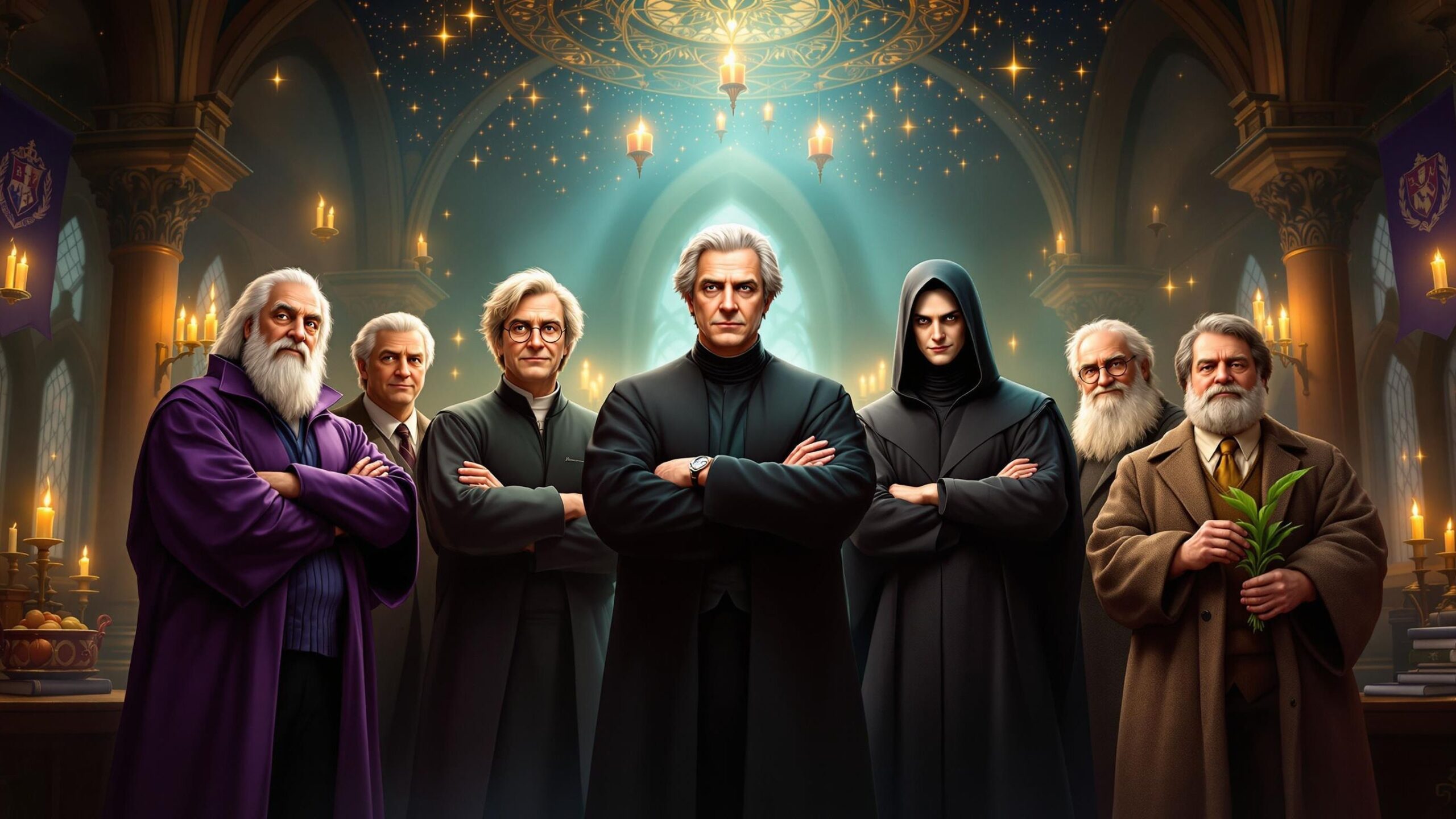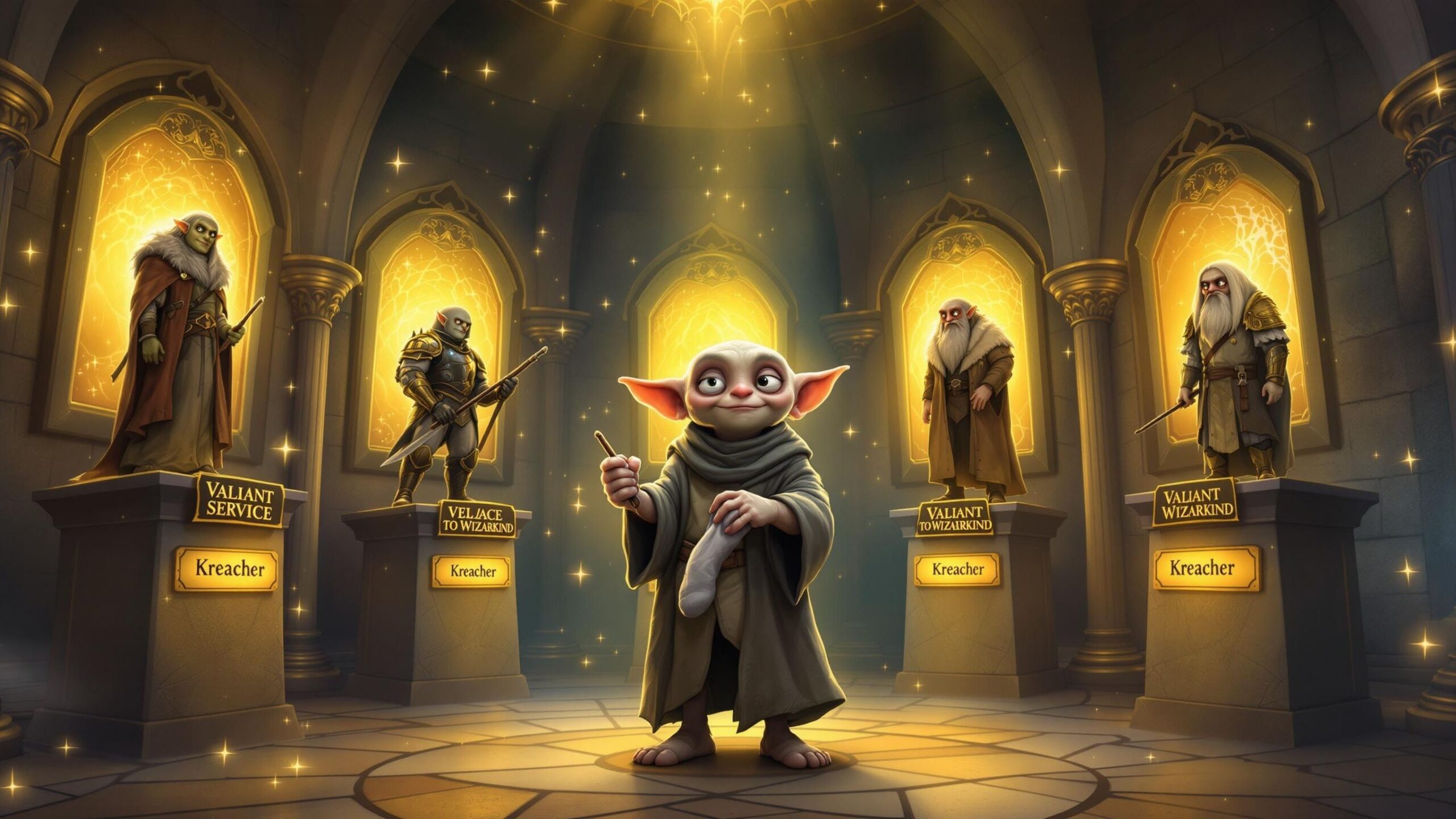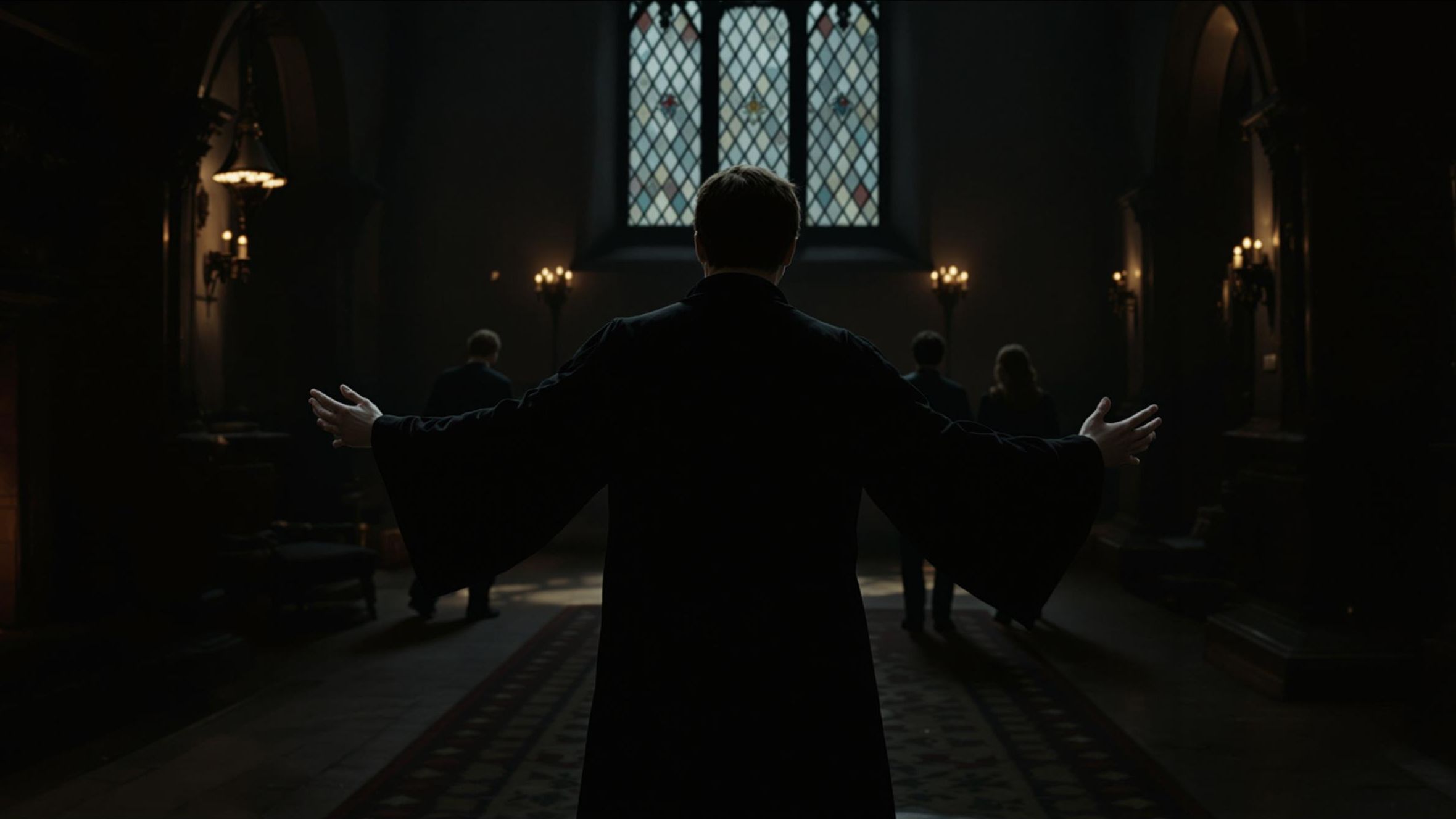Hogwarts School of Witchcraft and Wizardry has long been more than just a castle tucked away in the Scottish Highlands—it’s a symbol of magic, legacy, and learning. For centuries, it has stood as the heart of the wizarding world, producing generations of witches and wizards who have gone on to change history. But at the very core of Hogwarts’ enchantment lies its faculty. These professors weren’t just instructors—they were pioneers, guardians, mentors, and, at times, soldiers. They held secrets, told stories, taught spells, and stood between the students and the darkness that threatened to engulf the world. Their legacies weren’t written merely in textbooks, but in the lives, they shaped, the wisdom they passed down, and the legends they left behind. From misunderstood visionaries to battle-hardened war heroes, these are the ten most legendary professors to ever walk the enchanted halls of Hogwarts.
#10: Horace Slughorn
Horace Slughorn might not have fit the mold of a typical hero, but his legacy is undeniable. A master of Potions and an unabashed elitist, Slughorn’s true talent lay in spotting potential in others—often before they even recognized it in themselves. He created what came to be known as the “Slug Club,” an informal network of promising students who would later become key figures in the wizarding world. This included not only magical prodigies but also influential politicians, Quidditch stars, and innovators. His knack for networking was legendary, and while his motivations weren’t always altruistic, he genuinely cared for the success of those he mentored. Behind his love of candied pineapple and velvet waistcoats was a deeply intelligent and strategic thinker. However, Slughorn also carried guilt for one of the most pivotal moments in magical history: revealing the concept of Horcruxes to a young Tom Riddle. That single conversation, though innocently given, had devastating consequences, and it haunted him for decades. When he returned to Hogwarts during Harry’s sixth year, it wasn’t just to teach—it was to atone. His arc from cowardice to courage reached its peak during the Battle of Hogwarts, where he fought valiantly beside his students and fellow professors. Slughorn was many things: opportunistic, charming, even vain—but he was also fiercely loyal when it mattered most.
#9: Filius Flitwick
Often underestimated due to his small stature and quiet demeanor, Professor Filius Flitwick was a powerhouse in the magical arts and a testament to how appearances can deceive. As the Charms Master at Hogwarts for decades, Flitwick introduced students to some of the most foundational and beloved spells in the wizarding world. His classes weren’t just informative—they were magical in the purest sense. With a twinkle in his eye and a knack for bringing even the most complex charms to life, Flitwick inspired generations of students to fall in love with spellwork. Beyond the classroom, Flitwick was a former dueling champion—a fact many students didn’t discover until they saw him fiercely defending the castle during the Battle of Hogwarts. With his wand, he raised powerful enchantments to fortify the school, created magical barricades, and stood his ground with unwavering resolve. He was also the head of Ravenclaw House, guiding some of the brightest minds at Hogwarts with a mix of kindness, wit, and sharp intellect. Not many professors could balance brilliance with humility the way Flitwick did. He was a quiet force—one who didn’t seek the spotlight but left an enormous impact in his wake. The respect he earned came not from fear or authority, but from mastery and heart. His legacy is felt in every Leviosa and Lumos cast by students who first found their spark in his classroom.
#8: Sybill Trelawney
Professor Sybill Patricia Trelawney was, at first glance, the picture of a fraudulent seer—swathed in shawls, bangles, and incense smoke, predicting doom with a melodramatic flair that made her a favorite subject of ridicule among students and staff alike. But behind the haze of her eccentric theatrics lay a mystic gift that was, in rare moments, genuine and profound. Trelawney’s hiring by Dumbledore was no accident; she was the great-great-granddaughter of the celebrated seer Cassandra Trelawney, and her bloodline carried the potential for true prophecy. The most significant moment of her career came early—before she even began teaching—when she made the fateful prophecy that would shape the future of the wizarding world. Unbeknownst to her, that prophecy foretold the rise of Voldemort and the birth of the one destined to defeat him. Though she had no memory of making it, the implications of that moment were seismic. Her second true prophecy came during Harry’s third year, when she predicted Voldemort’s servant would return to him—a claim dismissed until it proved chillingly accurate. Despite her often-comical presence, Trelawney was fiercely proud and surprisingly brave. When Dolores Umbridge attempted to throw her out of Hogwarts, it was clear how deeply she considered the castle her home. In the Battle of Hogwarts, she abandoned her timid persona, hurling crystal balls at Death Eaters from balconies. Sybill Trelawney may have been mocked for her dreamy airs and constant predictions of death, but her place in the annals of Hogwarts is secured by prophecy, loyalty, and a quiet kind of courage.
#7: Rubeus Hagrid
With wild, tangled hair, a massive frame, and a booming voice full of warmth, Rubeus Hagrid was more than just a professor—he was a protector, friend, and icon. Though expelled from Hogwarts in his third year after being falsely accused of opening the Chamber of Secrets, Dumbledore saw Hagrid’s loyalty and kind heart and gave him a second chance. He was appointed Keeper of Keys and Grounds and later promoted to Care of Magical Creatures professor. Hagrid’s approach to teaching was unorthodox at best and dangerous at worst—bringing creatures like hippogriffs, thestrals, and even Blast-Ended Skrewts into the curriculum. But his lessons were filled with wonder, and his deep respect for magical beasts was infectious. Students may have balked at his creatures, but they never doubted his heart. Hagrid was a constant ally to Harry, Ron, and Hermione, often offering guidance (and tea) when they needed it most. He led the first-year students across the Black Lake, carried Harry’s seemingly lifeless body from the Forbidden Forest, and stood firm during the Battle of Hogwarts. He wasn’t the most technically skilled wizard, but his courage, compassion, and unwavering sense of right and wrong made him legendary in his own right. In a world of wands and spells, Hagrid’s true magic was love.
#6: Remus Lupin
If Hogwarts ever had a perfect Defense Against the Dark Arts professor, it was Remus John Lupin. Calm, wise, and quietly powerful, Lupin brought not just academic brilliance but a personal understanding of fear and prejudice into his lessons. A werewolf since childhood, Lupin spent his life battling both literal monsters and the societal stigma that followed him. Despite these hardships, he became one of the most compassionate and effective teachers Hogwarts had ever seen. His third-year class with Harry Potter was a turning point in the series, offering hands-on experience with boggarts, grindylows, and dementors. His teachings emphasized knowledge over fear, preparation over panic. Lupin’s time at Hogwarts also gave Harry his first true connection to his parents’ past, as Remus had been one of James Potter’s closest friends and a member of the original Order of the Phoenix. When his secret was revealed, he resigned to protect the school, despite Dumbledore’s full support. His departure was deeply mourned by students, a testament to how much he meant in just one year. Later, he returned to fight in the Battle of Hogwarts, where he and his wife Tonks tragically died. Yet his legacy lives on through the students he empowered and the son he left behind, Teddy Lupin. A warrior, a mentor, and a man who never let his condition define him, Lupin remains one of the most beloved professors in Hogwarts’ history.
#5: Alastor “Mad-Eye” Moody (Impersonated by Barty Crouch Jr.)
Though Alastor Moody never technically taught at Hogwarts in the traditional sense, his unforgettable tenure—courtesy of the imposter Barty Crouch Jr.—had a surprisingly positive impact. Under Crouch’s polyjuiced disguise, students received what might have been the most practical and intense Defense Against the Dark Arts lessons in Hogwarts history. “Moody” didn’t shy away from the hard truths, introducing the Unforgivable Curses in full force—terrifying, yes, but essential in the growing war. His lessons focused on constant vigilance, a philosophy that would resonate with Harry and others for years. Ironically, though impersonated by a Death Eater, the lessons taught during that year were perhaps the most effective preparation the students ever had for real-world conflict. When the truth came to light, it underscored the danger of the times but also highlighted the thin line between performance and purpose. The real Moody, who later joined the Order of the Phoenix and fought in the Second Wizarding War, was every bit as grizzled and formidable as the imposter had portrayed. His gruff exterior, magical prosthetics, and signature magical eye made him an imposing figure, but it was his dedication to rooting out evil and protecting the innocent that defined him. Even in absentia, “Mad-Eye” left a mark on Hogwarts that would never fade.
#4: Severus Snape
Severus Snape is arguably the most polarizing and complex figure to ever serve at Hogwarts. From the moment he glided into the dungeons with his black robes and billowing disdain, Snape captivated—and terrified—students. As Potions Master, and later as Defense Against the Dark Arts professor and Headmaster, he was a brilliant, if harsh, educator. His teaching style was unforgiving, laced with sarcasm and favoritism—especially toward Slytherins and against Harry Potter, whom he seemed to loathe with an unmatched intensity. Yet, behind that veneer of cruelty was a tortured soul burdened by secrets, regret, and a love that never died. Snape’s love for Lily Evans, Harry’s mother, defined his life and choices. That love led him to betray Voldemort, protect Harry in secret, and become Dumbledore’s most trusted double agent. Few knew the weight of his sacrifice until his death, when Harry accessed his memories and learned the truth. Snape had spent years walking a razor’s edge between good and evil, fooling even the most powerful Legilimens. He mastered Occlumency, created spells like Sectumsempra, and even protected the students during his time as headmaster, though covertly. His final act—passing Harry the knowledge he needed to defeat Voldemort—was as selfless as it was heroic. His most iconic moment remains his whispered confession to Dumbledore’s portrait: “Always.” Severus Snape was never an easy man to like, but he became one of the most tragic and legendary figures Hogwarts has ever known.
#3: Gilderoy Lockhart
In contrast to Snape’s dark depth, Gilderoy Lockhart was flamboyant, shallow, and absurdly self-absorbed—but nonetheless unforgettable. Appointed Defense Against the Dark Arts professor during Harry’s second year, Lockhart seemed to be the very picture of heroic wizardry, complete with flowing blond hair, pearly teeth, and a shelf full of bestselling autobiographies. But it didn’t take long for students—and staff—to realize that Lockhart was more smoke than fire. He had not performed the feats he claimed, but instead stole them from other witches and wizards, modifying their memories to pass the stories off as his own. In a delicious twist of irony, his own Memory Charm backfired thanks to Ron’s broken wand, leaving him permanently amnesiac. While his year at Hogwarts was filled with disaster—mishandling Cornish pixies, sabotaging dueling clubs, and causing more problems than he solved—he served as a cautionary tale. Lockhart was proof that charm and fame mean little without substance. Despite his incompetence, his presence was hilarious and unforgettable, and his legacy lingered through his books, which continued to be used (often mockingly) in the curriculum. In a way, Lockhart’s failure was part of his legend. He embodied the dangers of ego in a world that needed genuine courage. While he may not have taught much magic, he did leave behind a valuable lesson: never judge a wizard by his autograph.
#2: Minerva McGonagall
Professor Minerva McGonagall, with her stern eyes, square glasses, and clipped Scottish brogue, was the heart and spine of Hogwarts. As Deputy Headmistress, Head of Gryffindor House, and Transfiguration professor, she was a paragon of discipline, fairness, and formidable magical skill. McGonagall was an Animagus—a rare magical ability—transforming into a tabby cat with distinctive square markings. Her lessons in Transfiguration were challenging but rewarding, and she was revered for her command of the subject. While she maintained an intimidating presence, she was also deeply compassionate and fiercely protective of her students. She wasn’t afraid to go toe-to-toe with powerful figures like Dolores Umbridge or even the Ministry itself. During the final battle at Hogwarts, she led the defense of the school with brilliance and bravery, famously animating the school’s statues and suits of armor with a gleeful, “I’ve always wanted to use that spell.” Her relationship with Harry and his friends was one of tough love and deep respect. Though she rarely showed her emotions, her moments of warmth—such as awarding Hermione a Time-Turner or standing up for Neville—revealed the immense care she had for her students. McGonagall’s legacy is one of leadership, intelligence, and unwavering strength. She was not only Dumbledore’s trusted deputy but, after his death, the natural heir to his role. In many ways, she was the soul of Hogwarts—timeless, wise, and unshakable.
#1: Albus Dumbledore
There is no name more synonymous with Hogwarts than Albus Dumbledore. The very essence of wisdom, mystery, and magical greatness, Dumbledore’s legacy as Headmaster towers above all others. Before assuming that role, he was a celebrated Transfiguration professor and a prodigious student at Hogwarts himself. With his half-moon spectacles, long silver beard, and a twinkle in his eye, Dumbledore projected an image of whimsical serenity—but beneath that was one of the most powerful and complicated wizards in history. He defeated the dark wizard Grindelwald in 1945, discovered the twelve uses of dragon’s blood, and was considered the only wizard Voldemort ever feared. As Headmaster, he created a sanctuary for the unconventional, mentoring outcasts and nurturing potential in unexpected places—Snape, Hagrid, even Draco Malfoy. His approach to education emphasized compassion, curiosity, and self-reflection. Yet Dumbledore was far from perfect. His past was marred by ambition, a complex relationship with power, and the tragic death of his sister, Ariana. These mistakes humbled him and shaped his philosophies. He orchestrated a slow, painful plan to ultimately defeat Voldemort, even manipulating Harry’s journey with the knowledge that it would likely cost the boy his life. And yet, it was all done with an eye toward the greater good—a phrase that once led him astray, but which he redefined through sacrifice and love. Dumbledore’s death atop the Astronomy Tower was a moment of shattering loss, but also the culmination of his plans. His legacy lives not only in portraits and history books, but in every lesson, every spell, and every student who passed through the halls of Hogwarts under his guidance. A legend not only of Hogwarts, but of all wizarding history. From haunted halls and hidden passageways to bustling classrooms and enchanted staircases, Hogwarts is a place of infinite wonder—but it is the professors who gave it soul. These ten figures each left an indelible mark on the school, their influence echoing through every incantation whispered by a young witch or wizard. Whether by guiding the Boy Who Lived, sacrificing for a greater cause, or simply teaching students to believe in themselves, these professors became more than educators—they became legends. The legacy of Hogwarts is written not just in books and spells, but in the lives changed by those who taught within its walls. And in that legacy, these professors will always live on.




